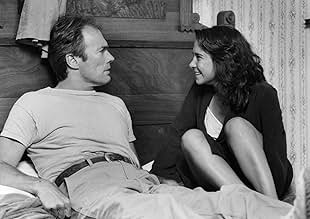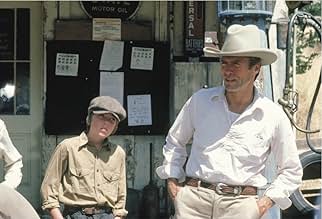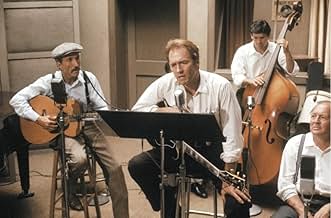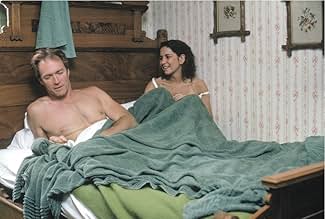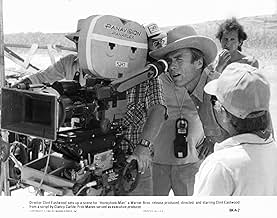IMDb RATING
6.6/10
9.7K
YOUR RATING
A boy with a music talent goes on a journey with his uncle for a stage concert.A boy with a music talent goes on a journey with his uncle for a stage concert.A boy with a music talent goes on a journey with his uncle for a stage concert.
- Awards
- 1 nomination
Storyline
Did you know
- TriviaThe script originally called for Whit (Kyle Eastwood) to get high from smoking marijuana, but Clint Eastwood, who is very anti-drug, refused, even with Kyle using a prop cigarette. Eastwood finally relented to his son's character getting high from a contact buzz.
- GoofsRyman Auditorium is used as the setting for the Opry. This venue was not used until the 1940s, and the movie takes place in the 1930s.
- Quotes
Highway Patrolman: [finds Marlene in the trunk of the car] Get out of there! It's against the law to ride in the trunk in this state. I don't suppose you've got any I.D., either?
Marlene: Idee? Idee 'bout what?
- Alternate versionsABC edited 7 minutes from this film for its 1986 network television premiere.
- ConnectionsFeatured in At the Movies: Dueling Critics (1983)
- SoundtracksHonkytonk Man
Sung by Marty Robbins and Clint Eastwood
Featured review
The critics didn't like this film, but I beg to differ. Perhaps I'm naive and gullible, but to me it rings true in its local color and the coping of poor people in the Depression amidst the aspirations of young and old alike.
My father, a published author in a small way, once mused to me that if he were to write a novel, it would be about someone trying to come to terms with his own mediocrity. Such is the theme of this movie, and hardly typical a consideration it is in a time when the media bombard us coast to coast, for our adulation, with the glamorous images of a mere handful of individuals who happen to have landed vast fame and fortune. What does any of this have to do with most of us? On the one hand, we live day to day. On the other, a recurring dream whispers "maybe..."
Knowing that he is living on borrowed time, Red, humble and hand-to-mouth but respected more than he knows by a few somewhat more successful colleagues (and an unusually fallible and vulnerable character for Eastwood, which he plays well) is granted, in extremis, an apparent opportunity to reach for the stars. More down-to-earth, he is also fortuitously blessed/burdened with not just one but two young proteges: first his nephew, then also a girl at loose ends. Perhaps neither is particularly talented; nevertheless both have a claim on his attention which he reluctantly fulfills in his own unassuming way, while making no exalted pretenses as to their prospects. When on his deathbed he can do no more for them, he commends them to each other. "You take care of her, now" he rasps to Whit. "She's okay. Help her with her singing." While they may never reach celebrity, the texture of life can sustain them if they face it together.
As, dying and perhaps delirious, he gazes up into Marlene's face, he sees the "raw-boned Okie woman" he had loved for several years as a mistress, and whom he later had regretted leaving. She had borne a girl whom he had never met. Marlene was a fatherless waif of about the right age. Did he recognize at the last moment his long-lost daughter? It is a question which the film leaves hanging in the air. Does genealogy matter? In practical terms, that is what she became almost too late.
For my money, it's a raw-boned, American Okie "La Boheme."
My father, a published author in a small way, once mused to me that if he were to write a novel, it would be about someone trying to come to terms with his own mediocrity. Such is the theme of this movie, and hardly typical a consideration it is in a time when the media bombard us coast to coast, for our adulation, with the glamorous images of a mere handful of individuals who happen to have landed vast fame and fortune. What does any of this have to do with most of us? On the one hand, we live day to day. On the other, a recurring dream whispers "maybe..."
Knowing that he is living on borrowed time, Red, humble and hand-to-mouth but respected more than he knows by a few somewhat more successful colleagues (and an unusually fallible and vulnerable character for Eastwood, which he plays well) is granted, in extremis, an apparent opportunity to reach for the stars. More down-to-earth, he is also fortuitously blessed/burdened with not just one but two young proteges: first his nephew, then also a girl at loose ends. Perhaps neither is particularly talented; nevertheless both have a claim on his attention which he reluctantly fulfills in his own unassuming way, while making no exalted pretenses as to their prospects. When on his deathbed he can do no more for them, he commends them to each other. "You take care of her, now" he rasps to Whit. "She's okay. Help her with her singing." While they may never reach celebrity, the texture of life can sustain them if they face it together.
As, dying and perhaps delirious, he gazes up into Marlene's face, he sees the "raw-boned Okie woman" he had loved for several years as a mistress, and whom he later had regretted leaving. She had borne a girl whom he had never met. Marlene was a fatherless waif of about the right age. Did he recognize at the last moment his long-lost daughter? It is a question which the film leaves hanging in the air. Does genealogy matter? In practical terms, that is what she became almost too late.
For my money, it's a raw-boned, American Okie "La Boheme."
- Cantoris-2
- Oct 12, 1999
- Permalink
- How long is Honkytonk Man?Powered by Alexa
Details
- Release date
- Country of origin
- Language
- Also known as
- El aventurero de medianoche
- Filming locations
- Fallon, Nevada, USA(scene with bull)
- Production company
- See more company credits at IMDbPro
Box office
- Budget
- $2,000,000 (estimated)
- Gross US & Canada
- $4,484,991
- Opening weekend US & Canada
- $667,727
- Dec 19, 1982
- Gross worldwide
- $4,484,991
Contribute to this page
Suggest an edit or add missing content



